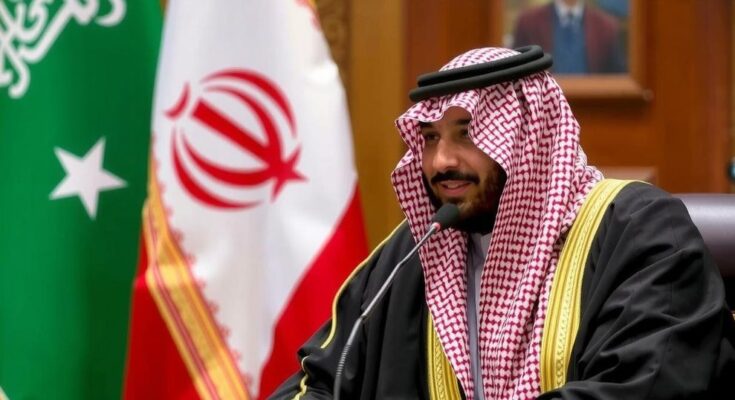Saudi Arabia’s military chief visited Iran, marking a significant step in thawing relations after years of hostility, coinciding with regional instability due to the ongoing Gaza conflict. The Saudi leadership has condemned Israeli actions in Palestine while advocates for a ceasefire emerge amidst rising violence.
In a significant diplomatic move, General Chief of Staff of the Saudi Armed Forces, Fayyad al-Ruwaili, visited Iran last week for a meeting with his Iranian counterpart. This high-level interaction marks a turning point in Saudi-Iranian relations, particularly following their agreement to restore diplomatic ties in March 2023 after years of enmity. The visit underscores the evolving geopolitical landscape in the Middle East, especially in light of the upcoming second term of United States President Donald Trump. Despite the absence of formal relations between Saudi Arabia and Israel, discussions on potential ties have taken place, primarily through conversations involving Jared Kushner, President Trump’s son-in-law, and Saudi Crown Prince Mohammed bin Salman. Additionally, Iran’s state media revealed that last year, Iran’s military leadership communicated with Saudi Defence Minister Khalid bin Salman to enhance defense cooperation and address regional issues, signaling a mutual interest in stabilizing the region. The recent Arab and Islamic summit held in Riyadh focused on the conflicts in Gaza and Lebanon, with leaders seeking unified actions. Crown Prince Mohammed bin Salman remarked on the situation in Gaza, emphatically denouncing the violence there, stating, “the Kingdom renews its call and categorical rejection of the genocide committed by Israel against the brotherly Palestinian people.” The Saudi Foreign Minister, during an earlier meeting, pushed for a ceasefire and the establishment of a two-state solution in response to the escalating violence. The conflict in Gaza escalated sharply on October 7, 2023, following an attack by Hamas on Israeli communities that resulted in extensive casualties and captives. The subsequent Israeli military response has led to devastating impacts on the Gaza Strip, with significant loss of life reported by Palestinian authorities, reiterating the urgent need for diplomatic resolutions and humanitarian considerations in the region.
The article discusses the recent diplomatic engagement between Saudi Arabia and Iran, highlighting the visit of Saudi Arabia’s military chief to Tehran. This marks a pivotal moment in a historically turbulent relationship between the two nations. The context for this meeting is rooted in their long-standing enmity and the broader geopolitical implications following the escalation of violence in Gaza. The Saudi Arabian leadership’s stance on the ongoing Israeli-Palestinian conflict is also crucial, as it reflects regional sentiments and the potential for shifts in alliances amidst ongoing conflicts.
In summary, the visit of the Saudi military chief to Iran signifies a potential thaw in relations between the two nations, particularly after years of hostility. With ongoing violence in Gaza and calls for a ceasefire, the geopolitical landscape in the Middle East may pivot towards greater regional cooperation and dialogue. The statements from Saudi leaders indicate a strong stance against Israel, further complicating the dynamics of international relations in the region.
Original Source: www.india.com




